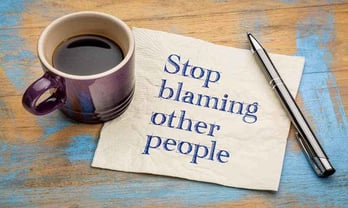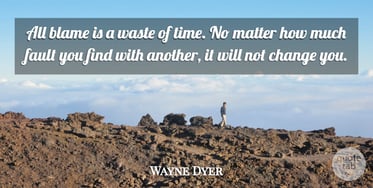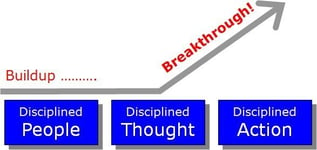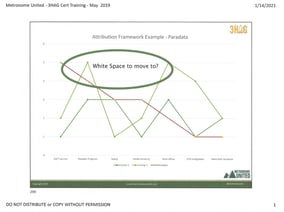 "All blame is a waste of time. No matter how much fault you find with another, and regardless of how much you blame him/her, it will not change you. The only thing blame does is to keep the focus off you when you are looking for external reasons to explain your unhappiness or frustration. You may succeed in making another feel guilty about something by blaming him, but you won't succeed in changing whatever it is about you that is making you unhappy."
"All blame is a waste of time. No matter how much fault you find with another, and regardless of how much you blame him/her, it will not change you. The only thing blame does is to keep the focus off you when you are looking for external reasons to explain your unhappiness or frustration. You may succeed in making another feel guilty about something by blaming him, but you won't succeed in changing whatever it is about you that is making you unhappy."
-- Wayne Dyer,
As a leader, I don’t believe there is any more powerful understanding than to recognize the power to take responsibility for your actions (or inactions when appropriate).
Failure to decide, reacting instead of being proactive, or waiting for others to act, is not something a successful leader can get away with. Ultimately you are responsible.
 In my last position in radio, before starting my coaching career, the general manager at the radio station constantly pointed the finger at others for why the station wasn’t doing well. He would make negative comments about people at the station, throw them under the bus, and take the credit for anything going right.
In my last position in radio, before starting my coaching career, the general manager at the radio station constantly pointed the finger at others for why the station wasn’t doing well. He would make negative comments about people at the station, throw them under the bus, and take the credit for anything going right.
Having failed to heed the warning of one of my former employees, I quickly realized his comments about the previous General Sales Manager at the station when he interviewed me, weren’t just an indicator of his blame mentality, it was a permanent flaw in his character.
As leaders we must be objective in evaluating the performance of others. In his case, his consistent approach to blame, were a pattern making the work environment toxic and for a culture inspired by fear.
NEVER CRITICIZE
Here are three good reasons to never criticize:
- Doesn’t do any good. The person you criticize simply becomes angry and antagonistic.
- Tears down people’s self-esteem.
- Every time you criticize someone else you tear yourself down simultaneously.
Take Responsibility. This video sums up why blaming others doesn’t help, and how to blame yourself, and accept responsibility.
ELIMINATE BLAME/CRITICISM - WHY
“It is impossible to say something good about someone else without making yourself feel better in the process. Likewise, it is impossible to say something bad about someone else without making yourself feel worse.”
~Brian Tracy, The Psychology of Achievement
Were you aware of this? It’s been said if you focus on what others do well, compliment and recognize them, soon they’ll be so busy doing good, they won’t have time to mess up or make mistakes.
If you realized when you find the good in others, recognizing them, you not only make them feel better, but make yourself feel better, soon both you and your people will feel so good it will seem impossible to fail.
.jpg?width=800&name=3%20Qualities%20of%20Leader%20(Brain%20Tracy).jpg) How can your people help YOU achieve more? To create an environment where everyone is inspired to give their best, contact us today to schedule a free exploratory meeting.
How can your people help YOU achieve more? To create an environment where everyone is inspired to give their best, contact us today to schedule a free exploratory meeting.
Growth demands Strategic Discipline.
 To build an enduring great organization, requires disciplined people, disciplined thought, disciplined action, to produce superior results, and make a distinctive impact in the world.
To build an enduring great organization, requires disciplined people, disciplined thought, disciplined action, to produce superior results, and make a distinctive impact in the world.
Discipline sustains momentum, over a long period of time, laying the foundations for lasting endurance.
A winning habit starts with 3 Strategic Disciplines: Priority, Metrics and Meeting Rhythms. -2.jpg?width=271&name=3%20Disciplines%20of%20Execution%20(Strategic%20Discipline)-2.jpg) Forecasting, accountability, individual, and team performance improve dramatically.
Forecasting, accountability, individual, and team performance improve dramatically.
Meeting Rhythms achieve a disciplined focus on performance metrics to drive growth.
Let Positioning Systems help your business achieve these outcomes on the Four most Important Decisions your business faces:
|
DECISION |
RESULT/OUTCOME |
|
PEOPLE |
|
|
STRATEGY |
|
|
EXECUTION |
|
|
CASH |
|
Positioning Systems helps mid-sized ($5M - $250M) business Scale-UP. We align your business to focus on Your One Thing! Contact dwick@positioningsystems.com to Scale Up your business! Take our Four Decisions Needs Assessment to discover how your business measures against other Scaled Up companies. We’ll contact you.
 NEXT BLOG – Does Differentiation Require Being the Best?
NEXT BLOG – Does Differentiation Require Being the Best?
Several weeks ago in Find Your White Space - Key Attribution Framework we explored how to differentiate your business in the marketplace. Next blog, we’ll share one contractors decision to do one thing exceptional, and why 3-5 key differentiators can be better than being the best.






.jpeg?width=150&height=135&name=Hand%20with%20marker%20writing%20the%20question%20Whats%20Next_%20(1).jpeg)

